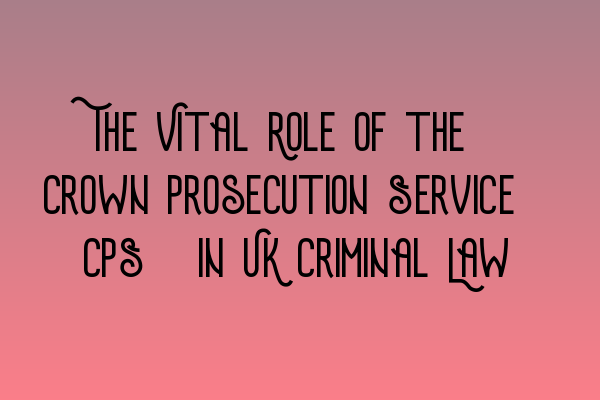**The Vital Role of the Crown Prosecution Service (CPS) in UK Criminal Law**
The Crown Prosecution Service (CPS) plays a crucial role in the criminal justice system of the United Kingdom. As the principal prosecuting authority, the CPS is responsible for bringing criminal cases to court on behalf of the Crown. In this blog post, we will explore the vital role played by the CPS in ensuring justice is served and the law is upheld.
1. **Prosecuting Criminal Cases:** The primary function of the CPS is to prosecute criminal cases in England and Wales. This involves deciding whether to charge individuals or organizations with criminal offenses based on the evidence presented by the police. The CPS’s duty is to ensure that there is a realistic prospect of conviction and that it is in the public interest to prosecute.
2. **Expert Legal Advice:** The CPS employs a team of experienced and highly skilled prosecutors who provide legal advice to the police during the investigative stage. Their expertise is essential in guiding the police on key legal issues, such as gathering admissible evidence, identifying potential witnesses, and ensuring compliance with legal procedures. This collaboration between the police and CPS helps build strong cases that stand up in court.
3. **Fair and Impartial Decision Making:** One of the core principles of the CPS is its commitment to fairness and impartiality. Prosecutors review cases objectively, considering all available evidence and legal guidance, to make decisions that are fair, consistent, and independent. This ensures that individuals are treated fairly by the criminal justice system and that justice is served.
4. **Support to Victims and Witnesses:** The CPS is dedicated to providing support to victims and witnesses throughout the criminal justice process. This includes keeping them informed of key developments, preparing them for court appearances, and addressing any concerns they may have. By offering this support, the CPS aims to increase confidence in the criminal justice system and enable victims and witnesses to give their best evidence in court.
5. **Advocate for Justice Reform:** The CPS actively contributes to the development of criminal law and policy in the UK. By analyzing trends, identifying gaps, and highlighting the need for legislative changes or procedural reforms, the CPS helps shape the criminal justice system to ensure it remains effective and responsive to the evolving needs of society.
6. **Specialist Units:** The CPS has specialized units that focus on specific areas of criminal law, such as fraud, cybercrime, and terrorism. These units are staffed by experts who possess extensive knowledge and experience in dealing with complex cases within their respective fields. Their expertise enhances the CPS’s ability to handle intricate and challenging prosecutions.
7. **Collaboration with Criminal Justice Agencies:** The CPS works closely with other criminal justice agencies, including the police, courts, and probation services, to ensure effective coordination and efficient case management. This collaboration is vital in streamlining the criminal justice process, reducing delays, and ensuring all parties involved work towards a common goal of upholding the rule of law.
In conclusion, the Crown Prosecution Service (CPS) plays a vital role in the criminal justice system of the United Kingdom. Through its expertise, impartiality, and commitment to justice, the CPS ensures that criminal cases are prosecuted fairly and effectively. By supporting victims, advocating for justice reform, and collaborating with other agencies, the CPS contributes to the overall efficiency and integrity of the criminal justice system. The CPS’s dedication to upholding the law and achieving justice makes it an indispensable component of the UK’s legal landscape.
